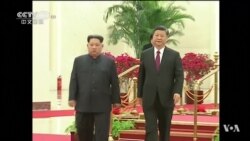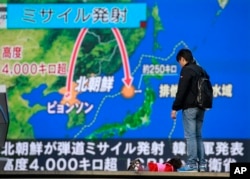U.S. President Donald Trump says there is "a good chance" North Korea leader Kim Jong Un will do "what is right for his people and for humanity" by moving to denuclearize the Korean Peninsula.
In a Twitter post early Wednesday, Trump said he looks forward to his planned meeting with Kim but emphasized the need to keep up "maximum sanctions and pressure" in the meantime.
China said during Kim's secretive visit to Beijing, he confirmed his commitment to denuclearize the Korean Peninsula and engage in talks with the United States and South Korea.
According to China's official Xinhua news agency, Kim made the unofficial visit from Sunday through Wednesday and met with Chinese President Xi Jinping.
Trump said Xi sent him a message saying his meeting with Kim went well and that the North Korea leader looked forward to meeting with Trump.
In another post, Trump touted his approach toward North Korea.
Kim-Xi Meeting
In the wake of the Kim-Xi meeting, White House Press Secretary Sarah Sanders said Wednesday the White House is cautiously optimistic, and feels "things are moving in the right direction," adding the meeting between Kim and Xi is a "good indication the maximum pressure campaign has been working."
Sanders noted it was Kim's first trip abroad since becoming the leader of North Korea, and the White House consider that to be another "positive sign that the maximum pressure campaign is continuing to work."
Regarding whether the meeting is on track to take place in May, Sanders told reporters the White House wants to make sure "it is done as soon as we can," but "we also want to make sure it's done properly, and we're working towards that goal."
Kim's visit to China was shrouded in secrecy and confirmed by Chinese state media Xinhua News Agency only after Kim had left the country.
According Xinhua's report, the two leaders reiterated the importance of maintaining the close China-North Korea alliance.
Denuclearization
On the issue of denuclearization, Xi told Kim that China "sticks to the goal of denuclearization of the peninsula," according to Xinhua.
The agency said Kim replied that he is prepared to resolve "the issue of the denuclearization" as long as South Korea and the United States "respond to our efforts with goodwill, create an atmosphere of peace and stability, while taking progressive and synchronous measures for the realization of peace."
“We have to understand very clearly what Kim’s phrase means,” Richard C. Bush, Director of Center for Northeast Asian Policy Studies of the Brookings Institution told VOA. "Based on how North Korea has elaborated on its conditions in the past, it probably means, at some point, the end of U.S.-R.O.K. alliance, the withdrawal of U.S. troops from the Korean Peninsula, the end of the U.S. nuclear umbrella.
"None of these things are something American or South Korean government would contemplate," Bush said.
WATCH: White House Sees Kim Jong Un Visit to China as Positive Step
"It is not a bad thing North Korea is again talking about denuclearization, on the other hand, based on how we understand how they define that objective, the U.S. should be very careful," he added.
The North's official Korean Central News Agency (KCNA) on Wednesday reported on Kim's visit to China, but did not mention a promise to denuclearize or the upcoming summits with the U.S. and South Korea.
China 'can't be left out'
Dennis Wilder, professor of Asian Studies at Georgetown University and former special assistant to the president and senior director for East Asian Affairs at the National Security Council, spoke with VOA following the announcement earlier this month of the possibility of a landmark meeting between Trump and Kim.
He said the Chinese may be "worried about being left out, that somehow the U.S. and North Korea might come to an agreement without consulting with them."
Through the Kim-Xi meeting, China is "making a big statement, that they are part of this process. They can't be left out of this process, and that the Americans and the South Koreans need to remember that," he added.
Earlier this month, Trump agreed to sit down with Kim, whom he once called "little rocket man," to discuss ending North Korea's nuclear program.
Outgoing Secretary of State Rex Tillerson said a "dramatic" and surprising change of posture by the North Korean leader led Trump to agree to the meeting. Trump said while he consulted with others, he made this decision to meet with Kim by himself.
In the past two years, North Korea has launched numerous medium and long-range ballistic missiles and conducted two nuclear tests, in large part to develop an capability to target U.S. mainland cities with a nuclear-armed intercontinental ballistic missile.
In response, the Trump administration employed what it called a "maximum pressure strategy," and led international efforts to pressure Pyongyang to halt its nuclear program by imposing tough sanctions that ban billions of dollars worth of North Korean coal, iron ore, clothing products and seafood exports. The Trump administration has also said that, if necessary, it is prepared to use military force to eliminate the nuclear threat.
In the last few months, Kim made a dramatic shift from his nonnegotiable position that North Korea is now a nuclear weapons state. Instead, he suspended nuclear and missile tests, participated in the Pyeongchang Olympics in South Korea, and offered to engage in nuclear talks. He is expected to meet with South Korean President Moon Jae-in next month and with Trump by May.
VOA Korean Service contributed.












